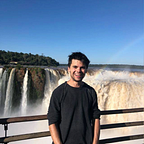Thoughts on On the Road
I recently finished On the Road, The Original Scroll by Jack Kerouac, 2+ years after initially picking it up.
I thought it’d be fitting on a long Europe trip in Dec, 2018, but I couldn’t get into it. Given that I’ve been moving around lots again, it felt like the right time. Not sure what it was this go-around, maybe a bit more patience with reading, but it was quite entertaining and thought-provoking.
For readers not familiar, here’s a brief synopsis.
In this version of the book, Kerouac writes voraciously. There aren’t chapters, nor even paragraph breaks. It was an adjustment, but I came to enjoy the style, and maybe even more the principle that writing doesn’t have to look a certain way.
As a short aside, I find these reviews/reflections helpful in processing the book for myself (rather than just picking up the next one), and I write them publicly for the hope that they resonate with someone else and/or encourage others to read & reflect on reading more!
The world was so different in the 40s & 50s.
It’s obvious with just a second of a thought, but easy to forget. The world that our grandparents (or great grandparents, or parents if you’re old reading this) grew up in had no technology, and transportation was dramatically different (among many other things).
As a few examples:
- They hitchhiked frequently & picked up hitchhikers
- Some of the hitchhikers they picked up were hobos! (imagine driving a random homeless person halfway across the country today)
- Characters ran away from their wives and children on adventures with very few ways to be reached and wound up coming back
- Money had to be wired across the country by parents
- One character stole 5–10 cars in a single night, dipped out of town and nobody even knew about it
Of all these differences, two stood out most.
1. Go-with-the-flow mentality around friendship & hangouts
You made plans by showing up at people’s houses, or agreeing to meet around a certain day and time.
Jack told his buddy in SF that he’d be there on a certain date and he ended up climbing in through the guy’s window 3 weeks late without notice he was running behind. Today, that would be largely unacceptable. We’re busy sticking to rigid, on-demand schedules.
On-demand life today has its perks since we can expect and know what’s coming and we can ‘maximize how much we do’ lol.
The flipside is the spontaneity and being able to enjoy the randomness of life—although certainly not gone for everyone—appears to have dwindled. Plus, maybe a note for myself more than anything, if plans change, it doesn’t mean it’s going to be a bad time.
2. Travel
In the story, they drove cross country countless times, following signs and with no GPS. They were pulled over and swindled by police, had wild adventures in random towns, and met countless others.
Traveling can look like that today, but, at least for me, it’s generally more planned.
Again, pros and cons, but at a high level, I’m glad that today I can choose my destinations, restaurants and sites given short windows of time to travel. The takeaway is for me to try and leave more space for getting lost or ending up somewhere random.
Presence
In On the Road, the main characters are deeply present. They live with everything out there and don’t have the opportunity to get distracted by tech (which I acknowledge is a choice today, and I’d rather have my phone than not).
That said, the only choice was to be present and to make the most of what that presence looked like. The book also glorified the characters that didn’t worry about the future, but rather about having the best time in the moment.
It can fall under rated amidst the worries and pressures of life today to capture each moment. Sorry to sound cliché but this book was a wonderful reminder.
Adventure & moving fast
The other clear theme of the book was adventure. Seeing new places, having new experiences and having a wild time. It’s motivation to take that up a notch.
Find others who will push you farther than you thought you could go
There’s always someone more adventurous and living more freely. If that’s important to you (which to me it is), then finding those people can be a step function in the activities you embark on.
I would never jump in the Atlantic Ocean at midnight in October myself, nor be the leader with others. But if someone is pushing me along, of course I’m going to go.
Energy and franticness aren’t bad in absolute terms!
For the anxious and fast-paced life we have, one thing that has been very top-of-mind is to slow down and rest.
To some degree, it’s important for a handful of reasons I won’t get into. The flip side, though, is that life is short, being young is temporary, and moving a million miles an hour isn’t always bad.
The characters in the book move at frantic paces, sometimes to the chagrin of those around them, but in doing so, are having a wonderful time and achieving/doing far more.
It’s a helpful reminder that judgement of doing too much or moving too fast isn’t outright correct, and having enough energy is important, but there’s no use is saving it either.
Thanks Kerouac, this was a fun one :)
